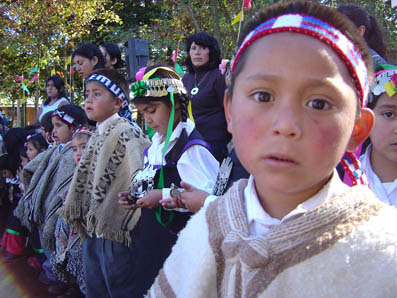This is a website community that we want to share with you.
The Unrepresented Nations and Peoples Organization (UNPO) is an international, nonviolent, and democratic membership organisation. Its members are indigenous peoples, minorities, and unrecognised or occupied territories who have joined together to protect and promote their human and cultural rights, to preserve their environments, and to find nonviolent solutions to conflicts which affect them.
In this website you can find many articles about indigenious peoples. We find an article about a Mapuche school that we want to share with you.
Mapuche: School of Self Government
Based on sections of the UN Declaration on the Rights of Indigenous Peoples, the Mapuche School of Self Government began its first day of classes.
Below is an article published by: Indian Country Today
Based on sections of the United Nations Declaration on the Rights of Indigenous Peoples, the Mapuche School of Self Government began its first day of classes January 14 [2009] in Temuko, Chile.
Faculty at the new institution include an internationally famous Chilean jurist who helped prosecute former dictator Augusto Pinochet as well as noted attorneys and Mapuche legislators.
The school’s general aim is to create “an institutional space for the Mapuche communities to implement Articles 3 and 4 of the declaration relative to the rights of indigenous self-determination and self-government,” according to a press statement issued by the Mapuche Council of All the Lands, the organization that created the new school.
The mission of the school will be “to contribute, through education and training, to the formation of Mapuche leaders from different communities, organizations and different sectors of society. … On top of that the school will seek to create. … leadership based on the principles of free determination and self-government, and whose academic programs will bring about leadership that will contribute effectively to self government.”
The Mapuche council stated that, after the passage of the UN declaration, “we, the Mapuche, are entitled to the right of Free Determination, and as such, we have the responsibility to seek ways of implementing it in practical terms and to further broaden those aspects that concern Free Determination.”
At the first day [14 January 2009] gathering, the council’s leader, Aucán Huilcamán Paillama, said the need for the school arose, in large part, from the marginalization of the Mapuches by Chilean authorities.
“We understand that the Chilean state was formed two centuries ago, and in two centuries it operated the same way, without the Mapuches. We have made every effort towards having the state include us, and it has not done so, therefore today [14 January 2009] we set our own course, in a free manner, under the protection of international law. From today we invite all people dedicated to Mapuche self government to be part of this process.”
One of the people attending the opening ceremonies was the new faculty’s most famous professor, former Judge Juan Guzman Tapia. He gained international attention and respect for indicting and prosecuting Pinochet. He is also the dean of the University of Chile’s School of Law, one of the country’s most prestigious institutions. Other faculty members at the Mapuche School of Self Government include attorneys Rodrigo Calderon, Juan Sanhueza, indigenous leaders such as Lonko Aniceto Norin Catriman, former congressman Rosendo Huenuman and Huilcamán Paillama, who is an expert on international indigenous law.
Starting off with a blessing ceremony, the first academic session featured “A teaching module on government issues based on international law relative to the rights of Mapuche self-determination and self government” according to the press release.
[The Mapuche people have resided in what are now parts of Chile and Argentina for thousands of years, and are famous for their successful resistance against first the Spanish and then both the Chilean and Argentine governments until the late 19th century.]
If you want to vistit this website, it is the link,
http://www.unpo.org/

No comments:
Post a Comment